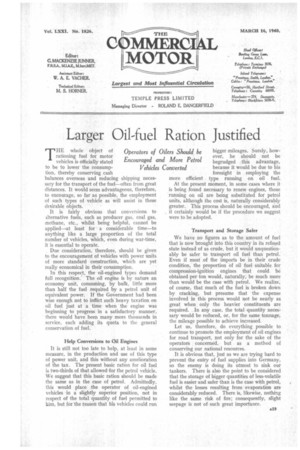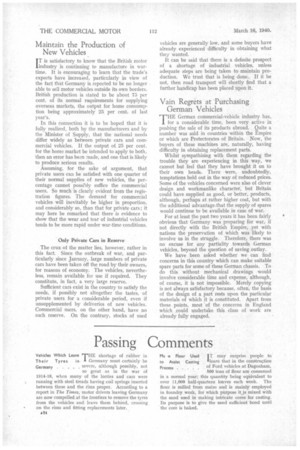Larger Oil-fuel Ration justified
Page 25

Page 26

If you've noticed an error in this article please click here to report it so we can fix it.
THE whole object of rationing fuel for motor vehicles is officially stated to be to lower the consumption, thereby conserving cash balances overseas and reducing shipping necessary for the transport of the fuel—often from great distances. It would seem advantageous, therefore, to encourage, so far as possible, the employment of such types of vehicle as will assist in these desirable objects.
It is fairly obvious that conversions to tIternative fuels, such as producer gas, coal gas, methane, etc., whilst being helpful, cannot be applied—at least for a considerable time—to anything like a large proportion of the total number of vehicles, which, even during war-time, it is essential to operate.
Due consideration, therefore, should be given to the encouragement of vehicles with power units of more standard construction, which are yet really economical in their consumption.
In this respect, the oil-engined types demand full recognition. The oil engine is by nature an economy unit, consuming, by bulk, little more than half the fuel required by a petrol unit of equivalent power. If the Government had been wise enough not to inflict such heavy taxation on oil fuel just at a time when the engine was beginning to progress in a satisfactory manner, there would have been many more thousands in service, each adding its quota to the general conservation of fuel.
Help Conversions to Oil Engines It is still not too late to help, at least in some measure, in the production and use of this type of power unit, and this without any amelioration of the tax. The present basic ration for oil fuel is two-thirds of that allowed for the petrol vehicle. We suggest that this basic ration should be made the same as in the case of petrol. Admittedly, this would place the operator of oil-engined vehicles in a slightly superior position, not in respect of the total quantity of fuel permitted to him, but for the reason that his vehicles could run bigger mileages. Surely, however, he should not be begrudged this advantage, because it would be due to his foresight in employing the more efficient type running on oil fuel.
At the present moment, in some cases where it is being found necessary to renew engines, those running on oil are being substituted for petrol units, although the cost is, naturally considerably greater. This process should be encouraged, and it certainly would be if the procedure we suggest were to be adopted.
Transport and Storage Safer We have no figures as to the amount of fuel that is now brought into this country in its refilled state instead of as crude, but it would unquestionably be safer to transport oil fuel than petrol. Even if most of the imports be in their crude condition, the proportion of oil fuel suitable for conipression-ignition engines that could be obtained per ton would, naturally, be much more than would be the case with petrol. We realize, of course, that much of the fuel is broken down by cracking, but presume that the expense involved in this process would not be nearly as great when only the heavier constituents are required. In any case, the total quantity necessary would be reduced, or, for the same tonnage, the mileage possible to achieve increased.
Let us, therefore, do everything possible to continue to promote the employment of oil engines for road transport, not only for the sake of the operators concerned, but as a method of conserving our national resources.
It is obvious that, just as we are trying hard to prevent the entry of fuel supplies into Germany, so the enemy is doing its utmost to sink our tankers. There is also the point to be considered that the storage of bigger quantities of less-volatile fuel is easier and safer than is the case with petrol, whilst the losses resulting from evaporation are considerably reduced. There is, likewise, nothing like the same risk of fire; consequently, Slight seepage is not of such great importance.
Maintain the Production of New Vehicles
I T is satisfactory to know that the British motor industry is continuing to manufacture in wartime. It is encouraging to learn that the trade's exports have increased, particularly in view of the fact that Germany is reported to be no longer able to sell motor vehicles outside its own borders. British production is stated to be about 75 per cent, of its normal requirements for supplying overseas markets, the output for home consumption being approximately 25 per cent, of last year's.
In this connection it is to be hoped that it is fully realized, both by the manufacturers and by the Minister of Supply, that the national needs differ widely as between private cars and commercial vehicles. If the output of 25 per cent, for the home market be intended to apply to both, then an error has bean made, and one that is likely to produce serious results.
Assuming, for the sake of argument, that private users can be satisfied with one quarter of their normal supplies of new vehicles, the percentage cannot possibly suffice the commercial users. So much is clearly evident from the registration figures. The demand for commercial vehicles will inevitably be higher in proportion, and considerably so, than that for private cars ; it may here be remarked that there is evidence to show that the wear and tear of industrial vehicles tends to be more rapid under war-time conditions.
Only Private Cars in Reserve
The crux of the matter lies, however, rather in this fact. Since the outbreak of war, and particularly since January, large numbers of private cars have been taken off the road by their owners, for reasons of economy. The vehicles, nevertheless, remain available for use if required. They constitute, in fact, a very large reserve.
Sufficient cars exist in the country to satisfy the needs, if possibly not altogether the tastes, of private users for a considerable period, even if unsupplemented by deliveries of new vehicles. Commercial users, on the other hand, have no such reserve. On the contrary, stocks of used vehicles are generally low, and some buyers have already experienced difficulty in obtaining what they wanted.
It can be said that there is a definite prospect of a shortage of industrial vehicles, unless adequate steps are being taken to maintain production. We trust that is being done. If it be not, then road transport will shortly find that a further handicap has been placed upon it.
Vain Regrets at Purchasing German Vehicles
THE German commercial-vehicle industry has, for a considerable time, been very active in pushing the sale of its products abroad. Quite a number was sold in countries within the Empire or which are Protectorates of Britain. Now, the buyers of these machines are, naturally, having difficulty in obtaining replacement parts. Whilst sympathising with them regarding the trouble they are experiencing in this way, we cannot but feel that they have brought it on to their own heads. There were, undoubtedly, temptations held out in the way of reduced prices. Some of the vehicles concerned were also of clever design and workmanlike character, but Britain could have supplied as good, or better, products, although, perhaps at rather higher cost, but with the additional advantage.that the supply of spares would continue to be available in case of war.
For at least the past two years it has been fairly obvious that Germany was preparing for war, if not directly with the British Empire, yet with nations the preservation of which was likely to involve us in the struggle. Therefore, there was no excuse for any partiality towards German vehicles, beyond the question of saving outlay.
We have been asked whether we can find concerns in this country which can make suitable spare parts for some of these German chassis. To do this without mechanical drawings would involve considerable time and expense, although, of course, it is not impossible. Merely copying is not always satisfactory because, often, the basis of the design of a part rests upon the particular materials of which it is constituted. Apart from these points, most of the concerns in England which could undertake this class of work are already fully engaged.




































































